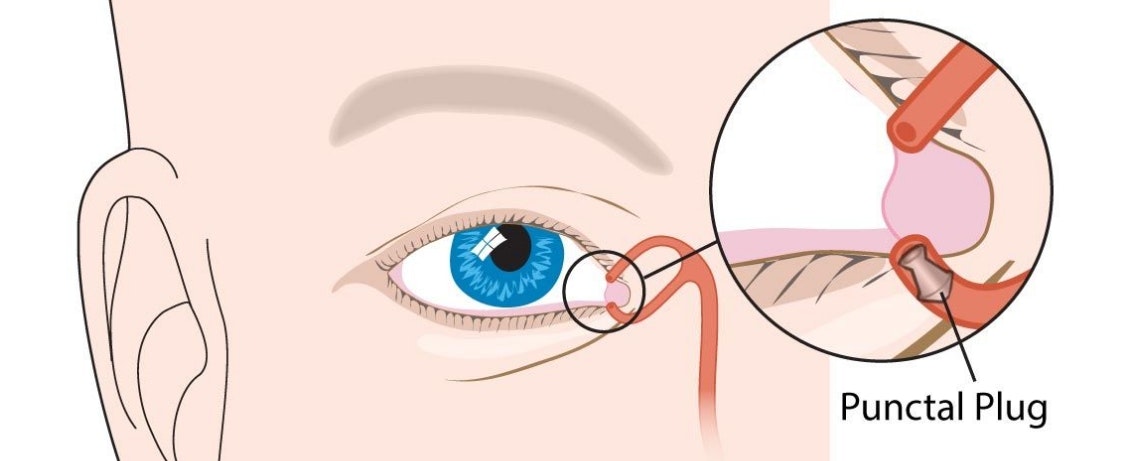Treatment for Dry Eyes
in Denver, CO
Dr. Justin Coco and his team use the latest tech to diagnose and treat dry eyes, giving you lasting relief from irritation, redness, and other symptoms.
Dozens of 5-Star Reviews
Most Insurance Plans Accepted
- CareCredit Financing Available
How We Treat Dry Eye Syndrome
Our treatment recommendation will depend on the cause of your condition. In some cases, simple lifestyle changes can provide relief from dry eyes. Your exam may reveal that less screen time, improved hydration, vitamin supplements, a humidifier, or other easy adjustments in your daily life can improve dry eyes. However, if we find that the cause of your dry eyes can't be solved with lifestyle changes, we also provide:
Punctal Plugs

If your tears drain too quickly, our doctors can apply punctal plugs to help slow or block the flow of your tears to the tear ducts (puncta). We will apply local anesthesia to numb the area before placing the plugs. Depending on your situation, our doctor may recommend plugging the upper puncta, lower puncta, or both at the same time.
LipiFlow

The LipiFlow® treatment can help patients who suffer from dry eye syndrome due to meibomian gland dysfunction (MGD), which deprives the tears of oil. Our doctors will apply numbing eye drops to maintain your comfort during the 12-minute procedure. This treatment essentially massages the meibomian glands using heat and gentle pressure to remove any obstructions such as congealed lipids.
ThermiEyes

ThermiEyes can also treat meibomian gland dysfunction by applying heat to liquify congealed oil and removing obstructions. However, ThermiEyes uses a handheld device that applies radiofrequency waves (the source of heat) and moves around the target area in a circular motion for 10 to 15 minutes. Our eye doctors may apply a cooling substance to the surrounding skin in preparation for treatment.
RESTASIS

RESTASIS® is a prescription eye drop that can treat dry eyes caused by chronic inflammation. Unlike artificial tears, RESTASIS can help your eyes generate more tears after three to six months of daily use. Patients should apply RESTASIS twice a day with 12 hours between each dose. Patients can still use artificial tear drops for temporary relief but must wait at least 15 minutes before applying RESTASIS.
Micro Exfoliation
In some cases, an abundant population of micro-organisms called Demodex mites can block the oil glands in your eyelids. Our doctors can perform a micro exfoliation in the area that gently scrubs away the organisms or other blockages so your meibomian glands can resume proper function.

Do You Struggle
With Dry Eyes?
Request a Consultation to Find the Solution
Are you suffering from ongoing eye irritation, itching, or watering; especially when wearing contact lenses? Reach out to our experienced team of doctors providing dry eye treatment in Denver, CO, so we can determine the best solution for your needs. We use the latest techniques and technology to diagnose eye conditions and create personalized treatment options.
You can reach out to our staff and submit your questions about dry eyes or request a consultation by calling our Denver optometry office at:
(303) 777-3277
Our office is conveniently located on the edge of Denver University's campus. We provide coffee, tea, and other amenities to create a comfortable atmosphere.
Colorado has dry air year-round due to the high altitudes and distance from major bodies of water. These dry conditions can increase your risk of suffering from dry eyes. Let us help bring your ocular health into harmony with the Centennial State.
Denver Recommends Hines
“My recent appointment with Dr. Coco was nothing short of excellent. He took the time to discuss my vision health and offered thoughtful advice on maintaining eye health.”
Eli, 5-Star Google Review
The Cost of Treating Dry Eyes
Since dry eyes impact your ocular health, your health insurance may cover at least part of the costs. However, coverage will depend on your insurance plan and the type of treatment you need. Our Denver staff can help you determine what your insurance will cover and plan treatments accordingly. While punctal plugs and medicated eye drops are typically covered, other treatments like LipiFlow often are not.
For patients without insurance, or those who want elective treatment, we offer flexible financing options through CareCredit®. CareCredit payment plans can help patients break up the cost of treatment into affordable monthly payments. We can prepare a quote for the cost of treatment once we have identified the cause of your dry eye.
Questions About Dry Eyes? Ask Our Eye Doctors
Our team is happy to answer your questions about dry eye syndrome, its various treatments, and how the condition may affect your candidacy for LASIK. Our doctors can then create a customized treatment plan to match your condition.
Request a consultation with our doctors or ask us a question by calling our Denver office at:
(303) 777-3277
“Outstanding.”
“I had an outstanding experience at Dr. Coco's optometry practice. Dr. Coco performed a thorough and efficient eye exam, taking the time to explain my vision changes and answering all my questions.”
Landon, 5-Star Google Review
Dry Eye Symptoms
Dry eye symptoms can vary from patient to patient, but the most common symptom is eye irritation. Other typical dry eye symptoms can include:
- Scratchy and burning feeling in the eyes
- Light sensitivity
- Tired eyes from reading or trying to focus on an object
- Heightened sensitivity to smoke or wind
- Decreased vision
- A decreased tolerance to contact lenses
What Causes Dry Eye Syndrome?
Dry eye syndrome is a condition that occurs when your tear glands do not produce enough liquid to keep your eyes moist. This moisture helps clear your eyes of debris like dust and helps them function normally. This condition can leave your eyes susceptible to infection, and when left untreated, dry eyes can eventually lead to significant damage.
Dry eyes can have multiple causes, including:
- Difficulty blinking (i.e., due to muscular or nerve issues)
- Environmental factors (such as wind, pollution, sun, and dry air)
- Certain procedures (such as LASIK and cataract surgery)
- Medications (such as decongestants or antihistamines)
- Age (after age 50, the tear glands may produce fewer tears)
- Blockages in the meibomian glands
- Certain medical conditions (such as diabetes or rheumatoid arthritis)
How Your Eye Retains Moisture
The tear film is made up of three separate layers:
- An outer layer consisting of oils that are released by the meibomian glands
- A middle layer consisting of water, the thickest of the three layers
- An inner layer of mucus closest to the cornea that spreads tears evenly over the eye
Your tears are produced in the lacrimal glands, which are located above each eye. Your tears then drain through the puncta, a set of small openings on the inside of your eyelids near the nose.

“Couldn't be happier.”
“I had my follow up care with Dr. Coco and I must say he is very knowledgeable and made me feel perfectly confident I was in good hands. My entire family receives eye care at Hines Sight. Couldn’t be happier with the service and care.”
May, 5-Star Google Review
FAQ Answers to Frequently Asked Questions about Dry Eyes
What does dry eye treatment cost?
The best way to understand what you can expect to pay for dry eye treatment is to schedule a consultation with our doctors. Most insurance plans contribute to the cost of an exam, as well as treatments like punctal plugs, RESTASIS, and in some cases, ThermiEyes. While treatments like LipiFlow and micro exfoliation are not typically covered, we offer financing that can make the cost fit your budget.
Can dry eyes cause blindness?
Dry eyes cannot cause you to lose vision, but corneal damage caused by dry eyes can. This is just one of many reasons why it pays to reach out to our practice as soon as possible if you notice frequent or long-lasting symptoms of dry eye syndrome.
Do dry eyes cause headaches?
Not directly—instead, the blurred vision that can result from dry eyes can force you to strain your eyes when reading or performing other tasks, which can eventually lead to headaches.
Can screen time cause dry eyes?
Prolonged time spent looking at a computer or phone screen can lead to dry eyes. This is often attributed to forgetting to blink and stay hydrated. If you spend long periods looking at screens, follow the 20-20-20 rule: every 20 minutes, look at something 20 feet away for 20 seconds. This practice also gives your eyes a break from the blue light emitted by screens, which is difficult for the eyes to process and can cause strain.
“This is the place to go!”
"I have been going to Hines Sight for years, and have always received the best eye care. The staff and doctors are very professional and competent. If you need your eyes cared for, this is the place to go!"
DJ, 5-Star Google Review






